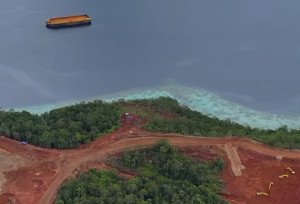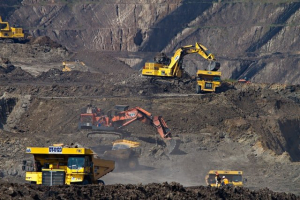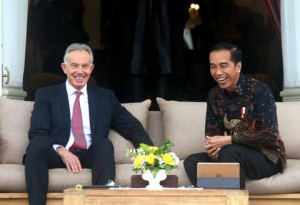Government revokes four mining permits in Raja Ampat upon presidential order
The government has officially revoked four mining permits (IUPs) in the world-renowned Raja Ampat archipelago, Southwest Papua Province, citing environmental concerns and a commitment to preserve the region's status as a leading ecotourism and marine biodiversity hub.
The government’s decision was announced by Minister of Energy and Mineral Resources (ESDM), Bahlil Lahadalia, following a presidential directive and results from a multi-ministerial coordination meeting.
"Starting today, the government has revoked four out of five mining permits operating in Raja Ampat," Bahlil told a press conference in Jakarta on Tuesday, June 10, 2025.
"This decision is a direct instruction from President Prabowo made after considering environmental, social, and economic concerns raised by local communities and national stakeholders," he added.
The four revoked permits belong to PT Nurham, PT Anugrah Surya Pertama, PT KW Sejahtera Mining, and PT Mulia Raymond Perkasa. The only remaining active permit belongs to PT Gag Nikel, a company with a long-standing Contract of Work (KK), which has been operating legally since its exploration license in the 1970s and began production in 2018.
Bahlil cited that the decision follows on-the-ground inspections, consultations with local government leaders − Governor of Southwest Papua and Regent of Raja Ampat − as well as feedback from environmental agencies and civil society groups.
"During Idul Adha, I personally visited Gag Island in Sorong and several surrounding islands to assess the situation directly. I wanted to see the reality on the ground − not just what was trending on social media," he said. "And what we found confirmed that four of the five permits were overlapping with geopark areas that are vital to our tourism and environmental conservation agenda."
Bahlil emphasized that the government's move was not reactionary, but based on months of inter-agency coordination under Presidential Decree No. 5/2024, which mandates a task force to audit and reorganize land and mining permit governance across Indonesia.
"Let me be clear: this is not about blaming anyone," he said. "Some of these permits were issued legally in 2004 and 2006 by regional administrations under the laws that existed at the time. But as national priorities evolve, especially regarding environmental sustainability, we must also adapt our decisions."
Environmental violations were a key consideration in the revocation. A report from the Ministry of Environment and the Ministry of Forestry highlighted multiple breaches of environmental regulations among the revoked permit holders, including poor reclamation practices and encroachment on protected zones.
In contrast, PT Gag Nikel − whose concession covers 13,136 hectares − has so far opened only 260 hectares for production, with more than half of that already rehabilitated or handed back to the State.
"The operations of PT Gag Nikel, which began exploration in 1972 and entered full production in 2018, have been closely monitored. Of the 260 hectares opened, about 130 hectares have already undergone reclamation, and approximately 54 hectares have been returned to the State," Bahlil said.
He urged the public to be discerning in consuming information.
“Many viral posts painted a misleading picture about widespread destruction in Raja Ampat, particularly around the famous Paynemo Island. But in reality, none of the revoked IUPs nor PT Gag Nikel are located on or directly adjacent to the Paynemo area, which remains fully protected,” the ESDM minister said.
He added that the government aims to maintain objectivity and transparency in handling natural resources.
“We are not anti-investment. But investment must be balanced with environmental integrity and public interest − especially in a region as precious as Raja Ampat.” he cited.
Bahlil concluded by reiterating that the government remains open to future investment in Raja Ampat, provided that it aligns with strict sustainability guidelines.
"This is not the end of development for Raja Ampat," he said. "It is a new chapter where we prioritize sustainable, community-based economic growth − tourism, fisheries, and environmentally responsible industries,” he concluded.
The government has pledged to work with local authorities and environmental experts to ensure proper reclamation and post-mining restoration of affected areas, as well as to support alternative livelihoods for communities previously dependent on mining operations.
Further technical details on the revocations, including enforcement timelines and legal follow-up, will be delivered by the ESDM Ministry in the coming days.
Already have an account? Sign In
-
Start reading
Freemium
-
Monthly Subscription
20% OFF$29.75
$37.19/MonthCancel anytime
This offer is open to all new subscribers!
Subscribe now -
Yearly Subscription
33% OFF$228.13
$340.5/YearCancel anytime
This offer is open to all new subscribers!
Subscribe now







